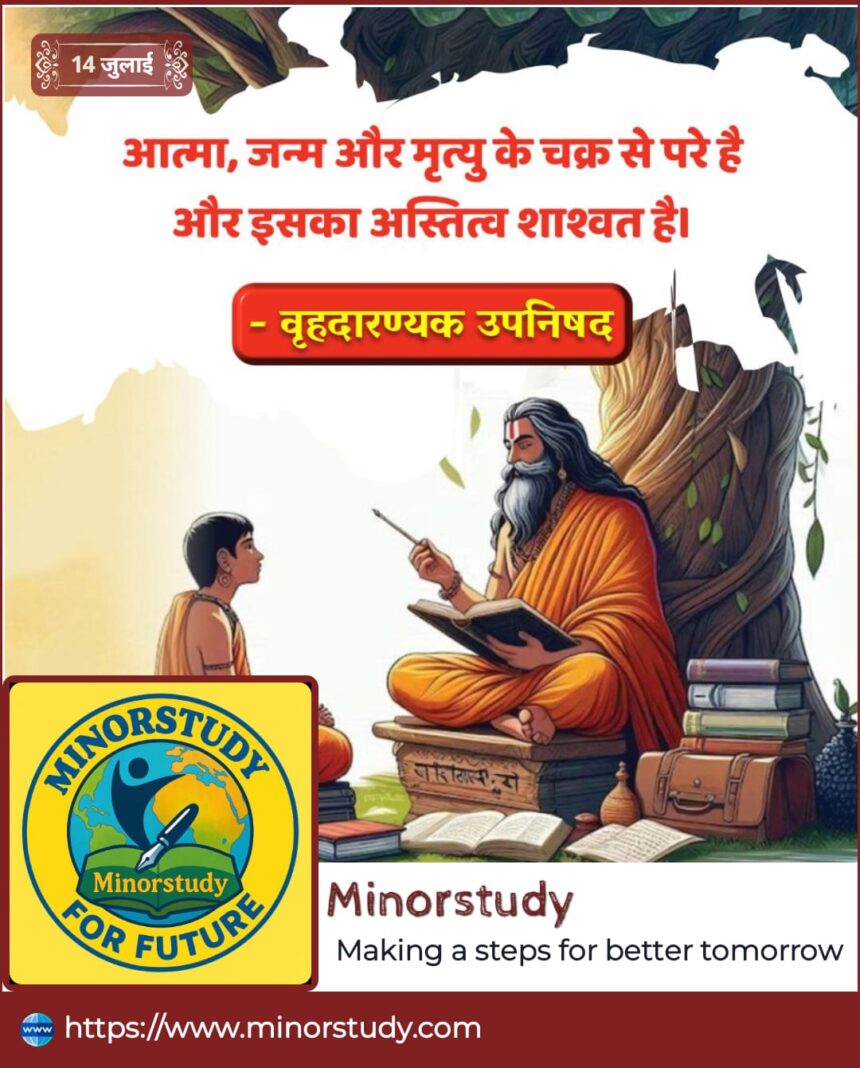9 Timeless Revelations from the Brihadaranyaka Upanishad That Prove the Soul Is Eternal – A Soul-Soothing Insight into Immortality
Quote:
“The soul is beyond the cycle of birth and death and its existence is eternal.”
— Brihadaranyaka Upanishad
- 📚 History and Background of the Brihadaranyaka Upanishad
- 🧠 Core Belief: The Eternal Nature of the Soul
- ✨ 9 Timeless Revelations from the Upanishad
- 1. The Atman Is Not Born, Nor Does It Die
- 2. You Are That – “Tat Tvam Asi”
- 3. All Fear Comes from Duality
- 4. The Self Is the Light of All Lights
- 5. Desire Is the Root of Rebirth
- 6. True Knowledge Is Self-Knowledge
- 7. Freedom Lies in Detachment
- 8. Death Is an Illusion for the Enlightened
- 9. The Self Is Bliss Itself
- 🙏 Significance in Daily Life
- 📅 Observance and Relevance Today
- 🎉 Wishing and Inspirational Message
- ❓ Frequently Asked Questions (FAQs)
- Q1. What is the Brihadaranyaka Upanishad mainly about?
- Q2. Who composed the Brihadaranyaka Upanishad?
- Q3. How is it relevant to our modern life?
- Q4. What makes the soul eternal according to this Upanishad?
- Q5. What does “Neti Neti” mean?
- 🪔 Conclusion: The Soul Never Dies – It Simply Is
This profound truth from one of the most ancient Upanishads of the Vedic tradition echoes through centuries, offering spiritual clarity in a world clouded by uncertainty, fear, and impermanence. The Brihadaranyaka Upanishad, with its intense philosophical vision, unfolds the mystery of the self—the soul or Atman—as immortal, unchanging, and infinite.
Let us journey through this divine scripture, explore its history, essence, and daily life importance, and discover how it transforms human consciousness even today.
📚 History and Background of the Brihadaranyaka Upanishad
🕉️ What is the Brihadaranyaka Upanishad?
Meaning of the Name: Brihad means ‘great’, and Aranyaka means ‘forest text’ – hence, the “Great Forest Teaching”.
It is one of the oldest and largest Upanishads of the Yajurveda.
Composed around 700–600 BCE, it is credited to sages such as Yajnavalkya, Gargi, and Janaka.
Considered one of the Mukhya (Principal) Upanishads and core to Vedantic philosophy.
🗓️ Timeline Snapshot
| Period | Event |
|---|---|
| ~700–600 BCE | Composition of Brihadaranyaka Upanishad in forest hermitages |
| ~500 BCE | Vedanta system begins interpreting the Upanishads |
| ~800 CE | Adi Shankaracharya writes commentary (Bhashya) on it |
| Modern Era | Taught in ashrams, philosophy courses, and spiritual circles |
🧠 Core Belief: The Eternal Nature of the Soul
The Brihadaranyaka Upanishad declares:
“Asato mā sad gamaya, tamaso mā jyotir gamaya, mṛtyor mā amṛtaṁ gamaya”
(Lead me from the unreal to the real, from darkness to light, from death to immortality.)
It emphasizes that the true self (Atman) is not the body, mind, or emotions, but an eternal, deathless presence. This Atman is neither born nor does it die.
✨ 9 Timeless Revelations from the Upanishad
1. The Atman Is Not Born, Nor Does It Die
Just like the sky is unaffected by clouds, the soul is unaffected by bodily birth or death. It simply is.
“The Self is not this, not that (Neti, Neti)… It is imperishable, unchangeable, eternal.”
2. You Are That – “Tat Tvam Asi”
One of the Mahavakyas (Great Sayings):
“You are That” reveals the non-duality between the individual soul (Atman) and Brahman (Universal Soul).
3. All Fear Comes from Duality
Fear arises only when we see ourselves as separate—from God, others, or the universe.
The Upanishad says: “Where there is duality, there one sees another, smells another… But where everything is the Self, whom can one fear?”
4. The Self Is the Light of All Lights
The body does not shine by itself. The mind does not illuminate itself. The Atman is the light by which everything else is known—including thoughts and experience.
5. Desire Is the Root of Rebirth
Desires tie the soul to the cycle of birth and death.
“A person becomes what he desires.”
Thus, freedom from desire leads to liberation (moksha).
6. True Knowledge Is Self-Knowledge
Knowing everything in the world is inferior to knowing oneself.
“He who sees all beings in the Self, and the Self in all beings—he never turns away from it.”
7. Freedom Lies in Detachment
By understanding the impermanence of all worldly things, one naturally becomes free, calm, and fearless.
“The knower of the Self becomes untouched by evil, sorrow, and fear.”
8. Death Is an Illusion for the Enlightened
The Upanishad makes clear that death applies only to the body, not to the eternal Atman.
This brings solace in grief and courage in hardship.
9. The Self Is Bliss Itself
The Upanishad says that true bliss doesn’t come from external sources, but from abiding in the Self, which is pure joy (ananda).
🙏 Significance in Daily Life
🧘♀️ Personal Impact:
Encourages fearlessness in the face of aging or death.
Builds inner strength to endure loss and suffering.
Promotes self-inquiry instead of blind belief.
🧑🤝🧑 Social Impact:
Encourages non-violence and compassion, seeing the same Self in all.
Dismantles ego, pride, and hate—building a harmonious society.
🕉️ Spiritual Relevance:
Foundation for Vedanta, Advaita (non-dualism), and meditation practices.
Central to the philosophy of Adi Shankaracharya, Ramana Maharshi, and modern mystics.
📅 Observance and Relevance Today
Taught in Vedic schools, ashrams, and retreats across India and the world.
Recited in funeral rituals and meditation practices for reflecting on the eternal Self.
Studied in modern philosophy, comparative religion, and yoga teacher training.
🎉 Wishing and Inspirational Message
🌼 May the eternal wisdom of the Brihadaranyaka Upanishad shine in your life like a guiding flame.
May you realise that you are more than your body and mind — you are immortal, indestructible, and divine.
Fear not, for the soul within you is beyond birth and death. You are That. 🌼
❓ Frequently Asked Questions (FAQs)
Q1. What is the Brihadaranyaka Upanishad mainly about?
A: It explores the eternal nature of the soul (Atman), the oneness of reality, and the path to self-realisation and liberation.
Q2. Who composed the Brihadaranyaka Upanishad?
A: Attributed to sage Yajnavalkya and other ancient rishis of the Yajurveda tradition.
Q3. How is it relevant to our modern life?
A: It provides a spiritual foundation for facing grief, anxiety, fear of death, and the meaning of life itself.
Q4. What makes the soul eternal according to this Upanishad?
A: The soul (Atman) is beyond change, not created, not destroyed, and is one with the Universal Self (Brahman)—thus, it is eternal.
Q5. What does “Neti Neti” mean?
A: It means “Not this, Not that”, a process of negation used to realise the Self by rejecting what it is not—body, mind, senses, etc.
🪔 Conclusion: The Soul Never Dies – It Simply Is
The Brihadaranyaka Upanishad does not give dogma. It gives clarity.
It tells us that we are not mere mortals born to suffer and perish—but immortal flames of divine existence.
To know the Self is to know true freedom.
To abide in the Self is to find unshakable peace.
Let this great teaching comfort you in grief, anchor you in chaos, and uplift you in spiritual longing.
“You are not this body or this fleeting life. You are eternal. You are the Self. You are That.” – Tat Tvam Asi.









Fantastic website. A lot of helpful info here. I am sending it to a
few pals ans also sharing in delicious. And of course, thank you for your effort!